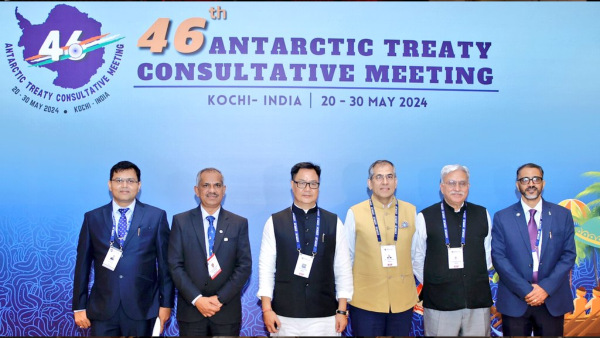





Disclaimer: Copyright infringement is not intended.
Context:
46th Antarctic Treaty Consultative Meeting (ATCM 46)
Agenda before ATCM
The Antarctic Treaty
The Antarctic Treaty, which was signed during the Cold War, effectively designated Antarctica as a “no man’s land”, outside the bounds of international geopolitical competition. A few key features of the treaty are:
Today, the treaty forms the basis of all governance and activities in Antarctica, the fifth-largest continent on the planet.
India in Antarctica
|
1983 |
●India became a consultative party to the Antarctic Treaty. In this capacity, India votes and participates in all key decision-making processes regarding Antarctica. |
|
1983 |
●The first Indian Antarctica research station, Dakshin Gangotri, was set up in 1983, some 2,500 km from the South Pole in Queen Maud Land. The station operated till 1990. |
|
1989 |
●India set up its second Antarctica research station, named Maitri, in the Schirmacher Oasis, a 3-km wide ice-free plateau with over 100 freshwater lakes. It is still operational and located about 5 km from Russia’s Novolazarevskaya Station, and 90 km from Dakshin Gangotri. According to the National Centre for Polar and Ocean Research, Maitri can accommodate 65 persons in summer, and 25 in the winter. |
|
2012 |
●India inaugurated Bharati, its third Antarctica research station, located around 3,000 km east of Maitri, on the Prydz Bay coast. Although the station focuses on oceanographic and geologic study, the Indian Space Research Organisation (ISRO) utilises it for receiving Indian Remote sensing Satellite (IRS) data. The station can support up to 72 individuals during summer, and 47 in winter. |
|
2022 |
●India enacted the Antarctic Act, reaffirming its commitment to the Antarctic Treaty. |
|
● Future prospects |
●India plans to open a new station, Maitri II, a few kilometres from the ageing Maitri station. Operations are set to begin by 2029. |
Source:
|
PRACTICE QUESTION Q. With reference to the Antarctic Treaty, consider the following statements: 1) The treaty prohibits military activities and fortifications on the continent of Antarctica. 2) Consultative parties are those nations that have full voting rights and decision-making powers within the Antarctic Treaty System. 3) Nuclear testing and the disposal of radioactive waste materials are permitted in designated areas of Antarctica under the treaty. 4) India became a consultative party to the Antarctic Treaty in 1983. Which of the statements given above is/are correct? (a) only one Answer: c) Explanation: Statement 1 is correct: ●The Antarctic Treaty, signed in 1959, designates Antarctica as a demilitarized zone, prohibiting any military activities, including the establishment of military bases or fortifications, on the continent. Statement 2 is correct: ●Consultative parties are countries that have demonstrated their interest in Antarctica's governance by actively participating in scientific research and cooperating with other treaty parties. They have full voting rights and decision-making powers within the Antarctic Treaty System. ●Original signatories: Twelve countries — Argentina, Australia, Belgium, Chile, France, Japan, New Zealand, Norway, South Africa, the USSR, the United Kingdom, and the United States. Statement 3 is incorrect: ●The Antarctic Treaty expressly prohibits nuclear testing and the disposal of radioactive waste materials anywhere in Antarctica. This prohibition is one of the key provisions aimed at preserving the pristine environment of the continent. Statement 4 is correct: ●India became a consultative party to the Antarctic Treaty in 1983, signifying its active involvement in Antarctic scientific research and commitment to the principles outlined in the treaty. As a consultative party, India has voting rights and participates in decision-making processes related to Antarctic governance. |







© 2025 iasgyan. All right reserved